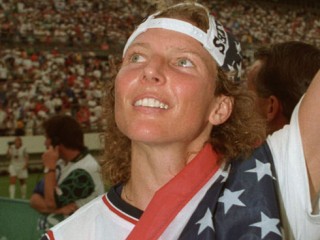
Michelle Akers biography
Date of birth : 1966-02-01
Date of death : -
Birthplace : Santa Clara, California, U.S.
Nationality : American
Category : Sports
Last modified : 2010-07-08
Credited as : Soccer player, ,
1 votes so far
Whenever American women's soccer teams have done great work, Michelle Akers has been there. Widely regarded as one of the best soccer players in the world, Akers has helped to move women's soccer into the limelight, initially as part of the first women's world champion team, and more recently as a member of the first-ever U.S. Olympic women's soccer team. Having played professional soccer for nearly a decade--and having been on U.S. national teams even longer--Akers is a fearsome competitor who can truthfully say, "I can score a goal when it's needed."
Born in Santa Clara, California, Akers grew up in the Pacific Northwest, attending public schools in Seattle. She was part of the first generation of American women to benefit from the 1972 federal legi-slation known as Title IX, which mandates gender equity in sports participation. Suddenly, just as Akers entered grade school, more emphasis was being placed on girls' sports, especially soccer. She was a ready and willing pupil.
Akers was a three-time All-American at Shorecrest High in Seattle. In college at the University of Central Florida, she accomplished the amazing feat of being named an All-American each of her four years in school. She made the roster of the U.S. national team in 1985, just prior to her college graduation, and has been a presence on that team ever since. While other national team members earn a living by coaching--mostly on the college level--Akers has achieved phenomenal success as a professional, playing in Europe. She spent three seasons in Sweden and helped her club, Tyreso, win the Swedish national championship in 1992. Other foreign teams have employed her services as well.
It is as an American champion that Akers has made her mark, though. By mid-1995 she had played in 87 games for the United States, scoring 82 goals. Her most memorable victory came in the first-ever FIFA women's world championship, held in China in 1991. In the tournament, Akers scored 10 goals in six games, including five in one match. She also scored the game-winning goal in the gold medal match against Norway, earning a roar of approval from the 63,000 spectators in Guangzhou, at China's Tianhe Stadium. For that victory and other accomplishments in 1991 she earned the Golden Boot Award.
The women's soccer world championship tournament is held every four years. In the interim between the 1991 and 1995 tournaments, problems developed for Akers. Although still widely considered the best American player, she has struggled for some time with Epstein-Barr syndrome, a virus that suppresses the immune system and leaves its victims weak and chronically tired. Akers played soccer for more than two years while suffering from the virus, becoming more and more physically and emotionally drained as time wore on. Since having been diagnosed with Epstein-Barr, she has learned to pace herself--the virus has no cure.
The lingering effects of her illness might have contributed to Akers's disappointing performance in the 1995 women's world championships. Seven minutes into the opening game of the tournament's first round, she suffered a concussion and a knee injury in a collision with another player. She missed three games and was viewed as being in less than top form in a losing match to Norway. The American women's soccer team won a bronze medal in the 1995 world championships, but another world stage had already arisen on the horizon: the 1996 Summer Olympics.
The 1996 Summer Games provide women's soccer with a whole new venue. Previously, women's soccer had not been sanctioned by the International Olympic Committee. Now it will be a regular part of the Summer Games, with 1996 its inaugural year. Although she will be over 30 by the time the 1996 Olympics are played, Akers plans to be a pivotal part of the team. "I always craved the opportunity to play in the Olympics," she told a Knight-Ridder reporter on September 29, 1993. "It will do so much for the future of our sport."
Because American women begin playing soccer at such an early age--and then pursue it in clubs, schools, and leagues--American women's soccer has a higher standing internationally than American men's soccer. The American women are not perceived as playing "catch-up" to better teams from other nations. "We're half the soccer-playing population in the United States," Akers told New York's Newsday on August 21, 1994. "Women's soccer is part of a huge cultural change around the world. We're starting to become a product when we can sell out 5-to-8,000 seat stadiums." For her part, Akers plans to be part of this "soccer revolution" well into the next century. "I still just love to play," she concluded in the Los Angeles Times on May 25, 1995. "I'm enjoying the game. . . . I'm still scoring goals, I'm still beating people, I'm still a force out here. . . . I can play in the year 2000." When that time comes, America's leading scorer will still be welcome on any field.
AWARDS
Named three-time high school All-American, 1982-84; four-time collegiate All-American, 1985-88; won Hermann Trophy; named U.S. Soccer's Female Athlete of the Year, 1990 and 1991; won Golden Boot Award, given to leading scorer at Women's World Cup, 1991.
CAREER
Played varsity high school soccer, 1980-84, three-time All-American; made U.S. Women's National Team, 1985--; played for University of Central Florida soccer team, 1984-89, four-time All-American; named leading goal scorer (with 10 goals) during the inaugural Women's World Cup in China and member of championship team, 1991; competed for Tyreso Football Club in Sweden, 1990, 1992, and 1994; scored more goals than any other male or female player in country during Swedish soccer season, 1992; named leading goal scorer during U.S. Olympic Festival, 1993; named U.S. Women's National Team all-time leading scorer, 1995.
















